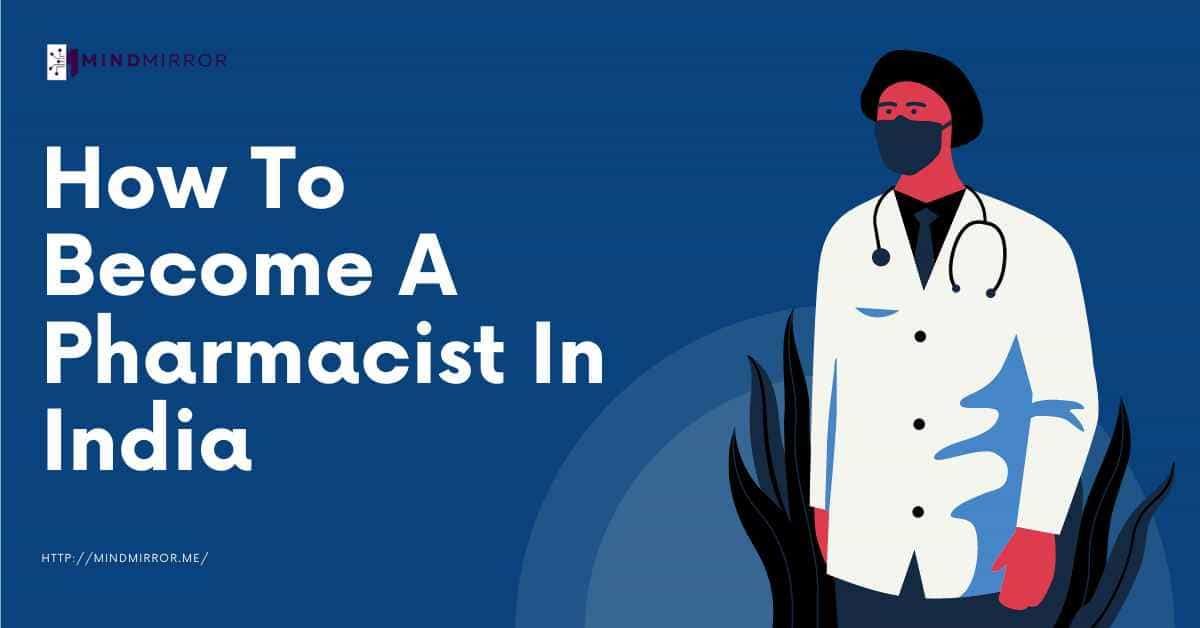Are you considering a career in the field of pharmacy in India? Becoming a pharmacist is an honorable profession that can provide you with a steady career path and the opportunity to make a real difference in the lives of your patients. This guide will give an overview of the scope of pharmacy in India, what qualifications and training are required to become a pharmacist, and the colleges and opportunities available to help you pursue a career in this field. Read on for more information about how to become a pharmacist in India.
Who Is A Pharmacist?
A pharmacist is an expert in medications and their safe use of them. They are responsible for dispensing prescription medications to patients, advising physicians and other healthcare professionals on drug therapies, providing drug information, monitoring patient drug therapies for safety and effectiveness, and much more. Pharmacists have an in-depth knowledge of the composition, effects, and uses of different medications and their interactions. In India, a pharmacist is an essential healthcare team member and plays a vital role in helping patients manage their health. Pharmacists are trained to understand drug use, properties, effects, and side effects. They can also advise patients on using the medication correctly and potential interactions with other medicines or supplements. As a result, pharmacists help ensure that patients receive the right drugs at the proper doses to benefit from their treatments.
Scope Of Pharmacy In India
Pharmacy is a rapidly growing field in India, with a high demand for skilled professionals in both the public and private sectors.
Opportunities in the public sector:
There are opportunities for pharmacists in government hospitals, health clinics, and research institutions in the public sector. They may also work in regulatory bodies such as the Central Drugs Standard Control Organization (CDSCO) or the Pharmacy Council of India (PCI).
Opportunities in the private sector:
There are opportunities for pharmacists in retail and hospital settings and the pharmaceutical industry in the private sector. Pharmacists may also choose to open their pharmacies or work as consultants.
Advancement opportunities:
Pharmacists can also advance in their careers by pursuing higher education and specialization in clinical pharmacy, pharmacology, and pharmaceutical chemistry.
Importance of pharmacy in the healthcare system:
Pharmacists play a crucial role in the healthcare system by ensuring the safe and effective use of medications. They also advise patients and healthcare professionals on appropriate drug use, monitor drug interactions, and side effects, and manage medication therapy.
Challenges and Issues:
Despite the growth in the field, there are challenges facing pharmacies in India. One major issue is the need for more qualified professionals, particularly in rural areas. Another issue is the pharmacy industry’s need for more regulation and oversight, which can lead to counterfeit and substandard drugs.
Overall, the scope of pharmacy in India is wide and varied, with opportunities in both the public and private sectors. However, there are also challenges to be addressed to improve the quality and accessibility of pharmacy services in the country. Furthermore, with the increasing demand for healthcare services, the role of pharmacy professionals is becoming increasingly important, and the need for such professionals is also increasing.
Eligibility Criteria For Becoming A Pharmacist In India
Here are some eligibility criteria for becoming a pharmacist in India:
Educational Qualifications:
To become a pharmacist in India, one must have a minimum diploma in Pharmacy (D.Pharm) or a Bachelor of Pharmacy (B.Pharm) degree. These programs are offered at various institutions across the country, and the curriculum covers subjects such as pharmacology, pharmaceutical chemistry, and pharmacy practice.
Entrance Exams:
To pursue a B.Pharm degree, students must clear an entrance exam such as the All India Common Entrance Test (AICET) conducted by the PCI.
Registration and Licensing:
Once they have completed their education, pharmacists must register with the PCI and obtain a license to practice. This involves passing an examination and meeting other requirements, such as continuing education and professional development.
Advancement Opportunities:
Pharmacists can advance their careers by pursuing postgraduate studies and specialization in clinical pharmacy, pharmacology, and pharmaceutical chemistry.
Age limit:
The age limit for the candidate varies from college to college, but it is generally between 17-25 years of age.
Medical fitness:
The candidate should be medically fit and not have any physical or mental disability which will hamper pharmacy practice.
Background check:
The institution or college also does the candidate’s background check to ensure that the candidate has not been involved in any illegal or unethical activities.
Becoming a pharmacist in India requires a minimum of a Diploma in Pharmacy or a Bachelor of Pharmacy degree and passing an entrance exam. After completing their education, pharmacists must register with the PCI and obtain a license to practice. There are many opportunities for advancement in the field, including postgraduate studies and specialization. The age limit, medical fitness, and background check are also considered when selecting a candidate for the pharmacy program.
Also Read:
List Of Pharmacy Colleges In India
Here are the top Colleges in India For every Medium Like a Pharmacy College, Regional College, Government College, and Private College.
Top Pharmacy Colleges in India:
- Manipal College of Pharmaceutical Sciences, Manipal
- Bombay College of Pharmacy, Mumbai
- Jamia Hamdard University, New Delhi
- Institute of Chemical Technology, Mumbai
- Birla Institute of Technology, Mesra
- Rajiv Gandhi University of Health Sciences, Bangalore
- P.S.G. College of Pharmacy, Coimbatore
- Madras Medical College, Chennai
- J.S.S. College of Pharmacy, Mysore
- National Institute of Pharmaceutical Education and Research, Mohali
Regional Colleges:
In addition to the colleges mentioned above, there are many other good pharmacy colleges in India, located in various regions of the country. Some of the notable regional colleges include:
- J.S.S. College of Pharmacy, Mysore
- Al-Ameen College of Pharmacy, Bengaluru
- NIPER, Hyderabad
- NIPER, Guwahati
- Punjabi University, Patiala
- Birla Institute of Technology, Ranchi
Government colleges:
There are many government colleges that also offer pharmacy programs; some of them are:
- Government College of Pharmacy, Karad
- Government College of Pharmacy, Aurangabad
- Government College of Pharmacy, Amravati
- Government College of Pharmacy, Nashik
- Government College of Pharmacy, Bangalore
Private colleges:
In addition to the colleges mentioned above, many private colleges also offer pharmacy programs. Some of the notable private colleges include:
- M.S. Ramaiah College of Pharmacy, Bengaluru
- P.S.G. College of Pharmacy, Coimbatore
- S.R.M. College of Pharmacy, Chennai
- J.S.S. College of Pharmacy, Ooty
- Pune Institute of Pharmacy, Pune
Many colleges in India offer pharmacy programs, including government and private institutions. The above list includes some of the top pharmacy colleges in India and regional and private colleges. College choice will depend on various factors such as location, fees, and reputation. It is also important to note that the above list needs to be completed, and many other colleges offer pharmacy programs in India.
Job Opportunities For Pharmacists In India
Job opportunities for pharmacists include retail pharmacies, hospitals, clinics, research and development, pharmaceutical companies, and government organizations.
Hospitals:
Pharmacists can work in government and private hospitals, where they are responsible for dispensing medication and providing advice to patients and medical staff. They may also be involved in the management of drug inventory and the preparation of medicine.
Retail pharmacies:
Pharmacists can work in retail pharmacies, dispensing medication, advising patients, and managing the pharmacy’s inventory. They may also be involved in selling over-the-counter medicines and health-related products.
Pharmaceutical industry:
Pharmacists can work in the pharmaceutical industry, where they are involved in the research, development, and production of medication. They may also be interested in the testing and approval of new medicines.
Regulatory Affairs:
Pharmacists can work in regulatory affairs, ensuring that the pharmaceutical products manufactured, marketed and distributed comply with the relevant laws and regulations.
Medical Sales:
Pharmacists can work in the medical sales department of pharmaceutical companies, where they are responsible for promoting and selling the company’s products to healthcare professionals and hospitals.
Clinical Research:
Pharmacists can work in the clinical research sector, where they are responsible for designing, implementing, and monitoring clinical trials of new drugs. They may also be involved in the analysis and interpretation of trial data.
Academic and Research:
Pharmacists can work in academic institutions and research organizations, where they teach and research in the pharmacy field.
Government Agencies:
Pharmacists can work in government agencies, such as the Food and Drug Administration (F.D.A.), responsible for regulating and inspecting pharmaceutical products.
Consulting:
Pharmacists can work as consultants, providing advice and support to healthcare professionals, patients, and pharmaceutical companies on various issues related to medication and health.
There are many job opportunities for pharmacists in India, including in hospitals, retail pharmacies, the pharmaceutical industry, regulatory affairs, medical sales, clinical research, academic and research institutions, government agencies, and as consultants. The job choice will depend on various factors such as personal interests, qualifications, and experience. It is also important to note that the above list needs to be completed, and there are many other job opportunities for pharmacists in India.
Pharmacists At Work
Pharmacists dispense medication, provide advice, manage drug inventory, prepare medication, monitor patient health, monitor drug interactions, keep records, advise healthcare professionals, participate in research and provide vaccinations.
Dispensing medication:
Pharmacists are responsible for dispensing medication to patients, including prescription medications and over-the-counter products. They ensure that the correct medication and dosage are provided to the right patient. They also offer advice on medicine and any potential side effects.
Providing advice:
Pharmacists advise patients, healthcare professionals, and other public members on various health-related issues. They may answer questions about medication, health conditions, and general health and wellness.
Management of drug inventory:
Pharmacists are responsible for managing the inventory of drugs in their pharmacies. They ensure an adequate supply of medication and that all medicines are stored correctly.
Preparation of medication:
Pharmacists may be involved in preparing medication, such as compounding and mixing ingredients to create a drug that meets a patient’s specific needs.
Monitoring patient health:
Pharmacists may monitor patients’ health, particularly those taking multiple medications, to ensure that the medication regimen works as intended and that there are no adverse reactions.
Monitoring drug interactions:
Pharmacists monitor drug interactions to ensure that patients are not taking medication that may interact negatively with each other.
Keeping records:
Pharmacists keep accurate records of medication dispensed and patients’ medical history. They use these records to provide advice and monitor the health of patients.
Advising physicians and nurses:
Pharmacists may advise physicians and nurses on the most appropriate medications for their patients, considering factors such as their medical history and allergies or sensitivities.
Participating in research:
Pharmacists may participate in research on new medications and treatment methods, which helps improve patient care and advance the pharmacy field.
Provide Vaccination:
Pharmacists can provide vaccinations under the supervision of a physician or nurse practitioner.
Pharmacists play a critical role in the healthcare system by providing medication and advice to patients, managing drug inventory, preparing medication, monitoring patient health, monitoring drug interactions, keeping records, advising healthcare professionals, and participating in research. They are also trained to provide vaccinations. As the healthcare system becomes more complex and patients have more access to information about their health and medications, pharmacists will play an even more critical role in ensuring that patients receive safe and effective care.
Conclusion
Becoming a pharmacist in India can be both a rewarding and challenging career path. With proper guidance, the right attitude, and a solid academic background, any aspiring pharmacist can make a great career in the Indian pharmaceutical sector. The job prospects for pharmacists in India are promising, as there is a huge demand for experienced professionals in this field. Moreover, with the help of various government initiatives and funding schemes, one can now easily access quality education in pharmacy in India. Thus, becoming a pharmacist in India is a great way to start a successful and lucrative career.
At MindMirror, we understand students’ challenges while choosing a suitable course or career. To make things easier, we provide personalized career counseling services to our clients so that they can find out which methods and career paths best suit their skills, interests, and financial circumstances. In addition, we use scientifically proven psychometric assessment tests such as Interest Inventory Tests, Aptitude Tests, and Personality Tests to identify the best-fit course or career for our clients. With our comprehensive services and extensive experience in helping students find their ideal practice or profession, MindMirror Education is an excellent resource for aspiring pharmacists who want to pursue their passion and turn it into a successful career.




